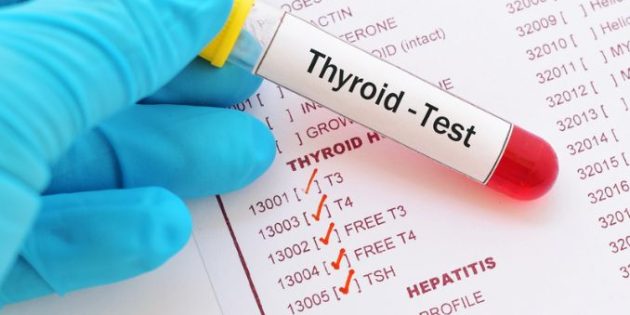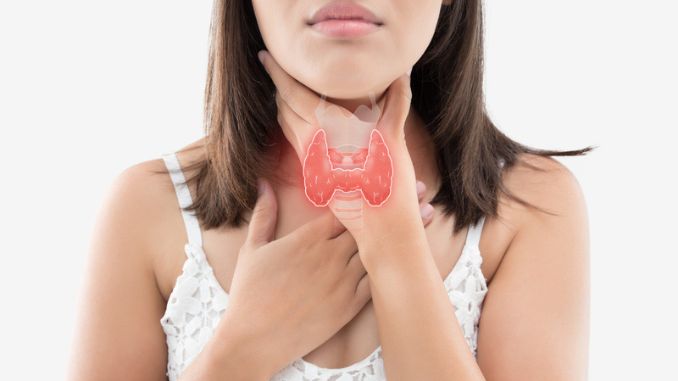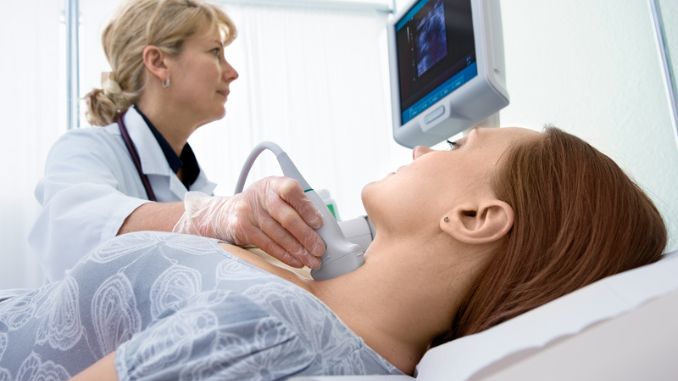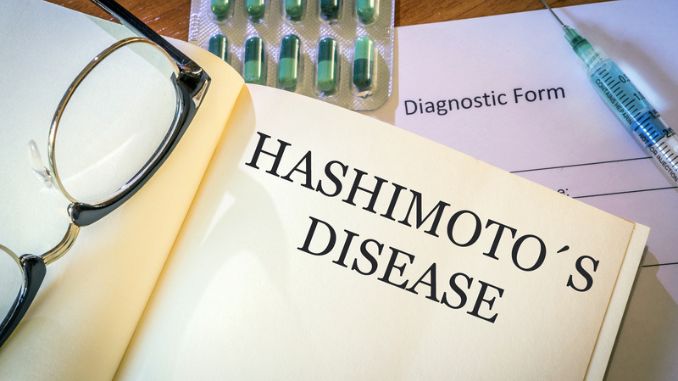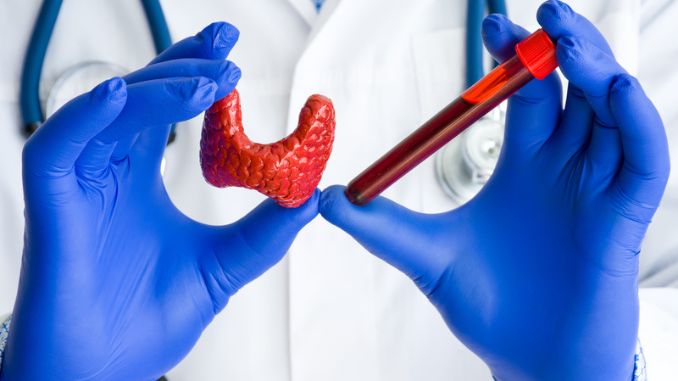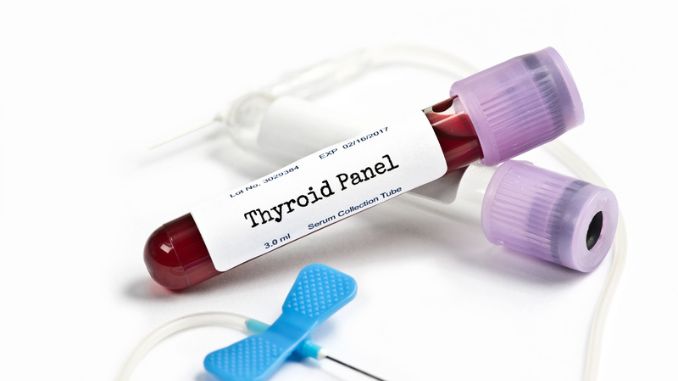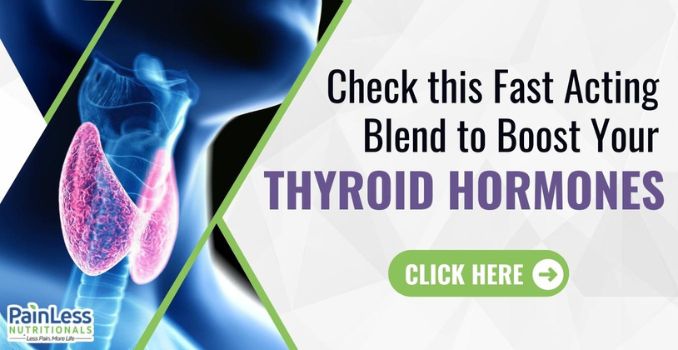Hypothyroidism, also referred to as an underactive thyroid gland, is a condition in which the thyroid gland doesn’t produce enough hormones, creating a deficiency of thyroid hormone in the body. This condition is common, affecting about 12% of women and 2% of men worldwide. In fact, women are ten times more likely to develop hypothyroidism than men.
The thyroid gland, a highly vascular, brownish-red gland located in the lower neck, produces thyroid hormones. The gland varies from an H to a U shape and is formed btwo 2 elongated lateral lobes with superior and inferior poles connected by a median isthmus. It has an average height of 12-15 mm.
What Happens in Hypothyroidism?
Hashimoto’s Disease is the most common cause of hypothyroidism in areas with adequate iodine intakes. This is an autoimmune disease characterized by the self-destruction of thyroid cells and is the most common cause of hypothyroidism in individuals older than six in the United States. In this condition, your immune system makes cells that attack your thyroid gland, which keeps it from working correctly. The treatment of choice for Hashimoto Thyroiditis, or hypothyroidism from any cause, is thyroid hormone replacement, orally administered levothyroxine sodium. Surprisingly, this chemically made, or synthetic thyroid hormone, works just like natural thyroid hormones in the body.
The deficiency of thyroid hormone has a wide range of effects. Systemic effects are the result of changes in metabolic processes.
In the gastrointestinal (GI) tract, achlorhydria ( absence of gastric acid ) and prolonged intestinal transit time can occur in hypothyroidism. Delayed puberty, anovulation, menstrual irregularities, and infertility are common. People with menstrual irregularities or infertility should routinely conduct TSH screening.
Decreased thyroid hormone can cause increased levels of total cholesterol and low-density lipoprotein (LDL) cholesterol. In addition, hypothyroidism may increase insulin resistance, predisposing a person with hypothyroidism to an increased risk of developing diabetes.
How Do You Know If You Have Hypothyroidism?
Hypothyroidism commonly manifests as slowing physical and mental activity but may be asymptomatic (show no symptoms). Symptoms are often subtle and neither sensitive nor specific, so it is best to check with your doctor if you have suspicions.
The following are symptoms of hypothyroidism:
- Fatigue, loss of energy, lethargy, sleepiness
- Weight gain despite decreased appetite
- Cold intolerance with dry skin and reduced perspiration or decreased sweating
- Hair loss
- Muscle pain, joint pain, weakness in the extremities
- Emotional lability or depression
- Mental impairment can include forgetfulness, impaired memory, and an inability to concentrate.
- Constipation
- Menstrual disturbances, impaired fertility
- Paresthesias
- Blurred vision and decreased hearing
- Fullness in the throat, hoarseness
The following are symptoms more specific to Hashimoto Thyroiditis:
- The feeling of fullness in the throat
- Painless thyroid enlargement
- Exhaustion or loss of energy and lethargy
- Transient neck pain, sore throat, or both
Additional Signs of Hypothyroidism Include:
- Slowed speech and movements
- Dry skin (or, rarely, yellow-hued skin from carotene)
- Pallor
- Coarse, brittle, or straw-like hair
- Loss of scalp hair, axillary hair, pubic hair, or a combination
- Dull facial expression
- Coarse facial features, some with periorbital puffiness
- Macroglossia or a disproportionately large tongue
- Goiter
- Hoarseness of voice
- A decrease in systolic blood pressure (the blood pressure during which the heart pumps) and an increase in diastolic blood pressure (the blood pressure during which the heart is relaxed)
- Bradycardia (a heart rate that is slower than usual, usually less than 60 beats/min in the general population and less than 50 in athletic individuals)
- Pericardial effusion (increase in the amount of pericardial fluid, which is the fluid surrounding the heart within the pericardium or the sac of the heart)
- Abdominal distention, ascites (a condition in which abnormally increased amount of fluid collects in spaces within your abdomen)
- Hypothermia (abnormally decreased body temperature) only in severe hypothyroid states
- Myxedema- swelling of the skin and underlying tissues giving a waxy consistency
- Visceral fat deposition
Although many symptoms of hypothyroidism can be the same in both men and women, some are specific and of particular concern to men. These include the following:
Sexual Dysfunction
This refers to any problem that affects your desire for or enjoyment of sex. Hypothyroid men can suffer from several types of sexual dysfunction. This includes low libido (or low sexual desire), erectile dysfunction, or delayed ejaculation (premature ejaculation is less common). While these symptoms may be alarming, they are often reversible with treatment. Hypothyroidism can also affect semen quality (defective form and movement) and semen quantity (lower than average sperm count). All of these factors can potentially lower men’s fertility.
Hair Loss
Hair loss can range from partial to very extensive. Other hair changes can also be seen in hypothyroidism, including dry, brittle, and coarse hair that may take longer to grow. Fortunately, with proper treatment, these changes can be reversed, too.
Low Testosterone
Testosterone is the primary sex hormone in males. In humans, testosterone plays a vital role in the development of male reproductive tissues and promotes secondary sexual characteristics such as increased muscle and bone mass.
Hypothyroidism can lower the levels of free testosterone in the blood. As a result, these decreases in testosterone can lead to physical changes that include increased body fat, decreased strength/muscle mass, fragile bones, reduced body hair, swelling/tenderness in the breast tissue, hot flashes, and increased fatigue. If a male has a low testosterone level, symptoms can include erectile dysfunction and a reduced sex drive.
Treating hypothyroidism can improve testosterone levels, so in men with low testosterone, a thyroid panel test should be part of the workup.
Muscle Weakness and Cramps
Hypothyroidism can also affect your muscles, causing weakness and cramps. This symptom is more common in men. Muscle weakness usually affects the muscles in the upper arms and legs. If this happens, doing simple activities like brushing your hair or getting up from a seated position can be challenging.
The mechanism of developing muscle weakness and cramps to hypothyroidism is unknown, but low thyroid levels may affect the muscle’s metabolism and ability to work well. As well, some people with hypothyroidism have a high creatinine kinase (CK) level, which usually increases in the blood with muscle injuries.
Thyroid Testing
The same workup is done for men and women in the general population. For example, a thyroid panel test that measures the level of thyroid-stimulating hormone (TSH), free tetraiodothyronine (FT4), and free triiodothyronine (FT3) will help to determine the cause of hypothyroidism.
Third-generation thyroid-stimulating hormone (TSH) assays are the most sensitive screening tool for primary hypothyroidism (defined as low levels of blood thyroid hormone due to destruction of the thyroid gland). Suppose TSH levels (the hormone produced by the pituitary gland to stimulate thyroid gland production of thyroid hormone) is above the reference range. In that case, the next step is to measure free thyroxine (FT4). Thereafter, there is no need for routine measurement of (T3) triiodothyronine.
Results in patients with hypothyroidism are as follows:
- Elevated TSH with decreased free thyroxine (FT4)
- Elevated TSH with standard free T4 is considered mild or subclinical hypothyroidism ( an early, mild form of hypothyroidism in which serum thyroid-stimulating hormone (TSH) level is above the upper limit of normal despite normal levels of serum free thyroxine)
Hypothyroidism Treatment
The treatment goals for hypothyroidism are to reverse clinical progression and correct metabolic derangements, as evidenced by normal blood levels of thyroid-stimulating hormone (TSH) and free thyroxine (T4). Thyroid hormone is administered to supplement or replace endogenous production. Hypothyroidism can be adequately treated with a constant daily dose of levothyroxine (LT4).
The World Health Organization (WHO) recommends a daily dietary iodine intake of 150 µg for adults, 200 µg for pregnant and lactating women, and 50-120 µg for children.
There are no specific diets for hypothyroidism, but foods rich in iodine are beneficial. Iodine-rich foods include:
- Fish (such as cod and tuna), seaweed, shrimp, and other seafood
- Dairy products (such as milk, yogurt, and cheese)
- Iodized salt
Hypothyroid patients should exercise caution with certain activities like contact sports and heavy physical labor since they may be at an increased risk of injury, particularly from excessive force across joints.
Hypothyroid patients should also use caution when engaging in an activity that poses a risk of injury (e.g., heavy equipment and driving) since they may have difficulty maintaining concentration in low-stimulus activities and may have slowed reaction times.
Undertreatment of hypothyroidism leads to disease progression, gradually worsening symptoms, and further metabolic derangements. Ultimately, it can result in profound coma or even death; in infants, it can cause irreversible mental retardation.
Thyroid hormone therapy reverses the signs and symptoms of hypothyroidism. In addition, other secondarily affected laboratory values such as hyperlipidemia (increased lipid level) should improve and normalize with treatment.
Once an appropriate therapeutic dosage is achieved, patients can be monitored annually or semiannually with laboratory evaluation and physical examination.
Aside from hormone replacement therapy, food supplements that boost thyroid hormone function are very important. Check out: Painless Nutritionals Thyroid Support.
